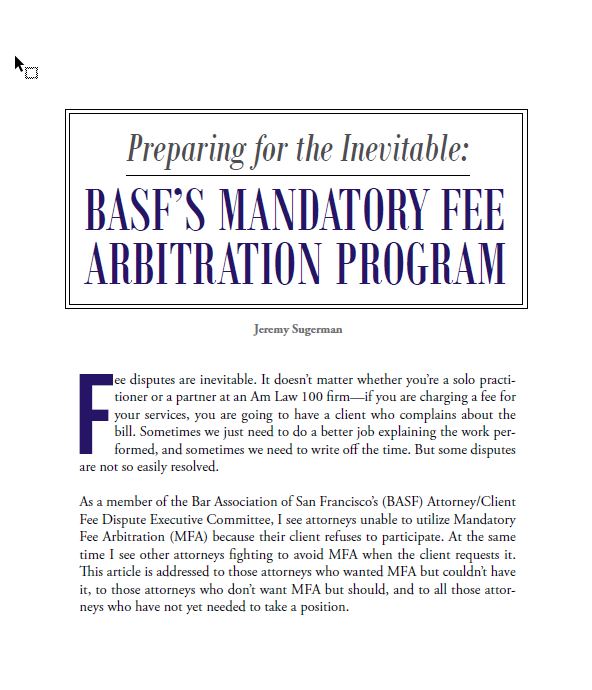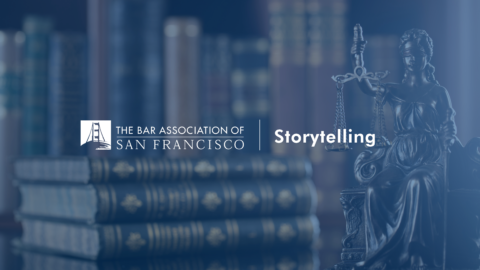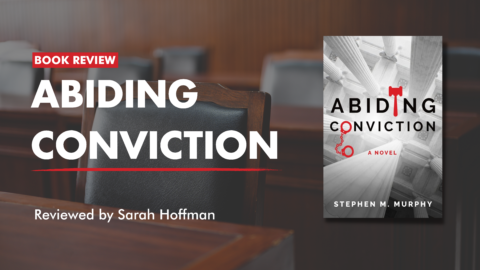
Fee disputes are inevitable. It doesn’t matter whether you’re a solo practitioner or a partner at an Am Law 100 firm—if you are charging a fee for your services, you are going to have a client who complains about the bill. Sometimes we just need to do a better job explaining the work performed, and sometimes we need to write off the time. But some disputes are not so easily resolved.
As a member of the Bar Association of San Francisco’s (BASF) Attorney/Client Fee Dispute Executive Committee, I see attorneys unable to utilize Mandatory Fee Arbitration (MFA) because their client refuses to participate. At the same time I see other attorneys fighting to avoid MFA when the client requests it. This article is addressed to those attorneys who wanted MFA but couldn’t have it, to those attorneys who don’t want MFA but should, and to all those attorneys who have not yet needed to take a position.
BASF’s Mandatory Fee Arbitration
The Mandatory Fee Arbitration Act (MFAA, Bus. & Prof. Code §§ 6200 et seq.), was enacted forty years ago to provide cheaper, faster, and confidential means to resolve attorney-client fee disputes. The MFAA grew out of the need to create a user-friendly, low-barrier process for clients to bring grievances involving fees and costs against their own attorneys. MFA has relatively simple procedures, does not allow attorney’s fee awards to prevailing parties, and allows a client to compel the attorney to participate but not vice versa. But there are significant and often overlooked benefits for attorneys as well. Among other things, MFA provides an out-of-court and therefore private arena for resolving fee disputes, and it allows the award to be non-binding by default.
The MFAA allows local bar associations to set up a State Bar-approved MFA program. According to the California State Bar’s website, there are currently thirty-five such local programs in California, in addition to the State Bar’s own.
BASF’s is one of the oldest and most respected in the state. We have a panel of dedicated arbitrators with expertise in all areas of law, including criminal law, who are trained to hear disputes; an executive committee of former arbitrators who review the awards before they are final; and dedicated staff who coordinate all aspects of the process. BASF’s program is also one of the only in California that offers mediation as an option prior to arbitration, at no extra cost.
How to Make Sure You Preserve the Ability to Compel MFA
Under the MFAA1, any attorney who wants to pursue a claim against a client for fees (either in court or through arbitration) must first give notice of the client’s right to arbitrate2 and participate in MFA. An attorney can’t compel a client to participate in MFA—unless you have a valid MFA clause in the fee agreement. (More on this below.) MFA does not involve malpractice claims, and fee arbitrators cannot award damages for malpractice.
Attorneys are required to participate in MFA if the client elects it, so long as the client has not waived the right to demand it (for instance, by instituting an affirmative claim for relief elsewhere, responding to a lawsuit over unpaid fees, delaying the request for MFA after getting notice from the attorney, or missing the applicable statute of limitations). If the client elects MFA and has not already waived it, any arbitration or litigation the attorney has instituted is then stayed until MFA is concluded.
Arbitrations involving disputes of amounts up to $25,000 are heard by a single arbitrator. A panel of three hears disputes over that amount, in which case one panelist is a non-attorney. The MFA is non-binding by default, but can be binding if all parties agree once the dispute arises.
A non-binding award will become final if no party seeks trial de novo (or “contractual arbitration de novo,” as the case may be) within 30 days of the award. An MFA can be confirmed in a court action, but confidentiality ends if either party files an action to confirm the award.
Benefits of MFA
If your fee dispute has gotten to the point where you will need a third party to resolve it, MFA under BASF’s rules has some significant advantages over litigation or contractual arbitration.
Confidentiality and no publicity
BASF’s Rules of Procedure provide that the arbitration case file, the papers, exhibits, transcripts, and award are all to remain confidential “except as may be necessary in connection with a judicial challenge to, confirmation or enforcement of, the Award….” And by choosing BASF’s MFA, you also decrease the chances that your name or the name of your firm will appear as either plaintiff or defendant on the court’s docket.
Expertise
All of our arbitration panelists are experienced in resolving attorney/client fee disputes. BASF provides arbitrator training, and arbitrators generally serve on multiple three-arbitrator panels before acting as a solo arbitrator or being appointed as a panel’s chief arbitrator. Many of the arbitrators have been with the program for a decade or longer, and some arbitrators and Executive Committee members have been with the program since its beginning.
Informal airing of the dispute
An MFA is typically (but not always) an informal event, where the parties get the opportunity to air the dispute. Your client will see you (or your counsel) explaining the reasons for your bills in a civil and respectful manner. Taking the dispute out of the realm of email and demand letters, while compelling the parties to meet face-to-face, will often reduce the likelihood of de novo litigation.
Speed
The process of resolving a dispute over fees and costs through BASF’s Attorney-Client Fee will be faster than a lawsuit. The typical MFA can take four to nine months from original request to final award.
Cost
MFA will generally cost the parties far less than litigation or contractual arbitration. First, discovery is permitted only by order of the arbitrator, and is extremely rare. Second, the parties’ out-of-pocket expenses are quite limited.
The filing fees to participate in MFA are currently 5 percent of the amount in dispute when the total disputed amount is $10,000 or less; and 7 percent (up to a maximum of $7,000) when the disputed amount is between $10,000 and $1 million. When the amount in dispute is $1 million or more, there is an additional $250 surcharge for each $1 million or fraction thereof over the first $1 million in dispute. (For example, a dispute concerning $150,000 will have a filing fee of $7,000; a dispute concerning $4 million will have a filing fee of just $7,750.)
Arbitrators will allocate the filing fees among the parties as part of the award. The parties are not charged for the arbitrators’ time in preparing for the arbitration and are not charged for the arbitrators’ hearing time, unless the hearing takes longer than a day, in which case the parties are required to compensate each arbitrator $500 for each additional half day (split between the parties).
Getting to MFA—the Valid MFA Clause
As I mentioned, a client can compel the attorney to participate but not vice versa, unless the parties have a valid MFA clause in the fee agreement.
BASF’s program routinely receives requests by attorneys to institute MFA, who then find that the process cannot move forward unless the client agrees—that is, unless the fee agreement contains a “valid MFA clause,” meaning a provision specifying that both client and attorney will participate in MFA in the event of a dispute as to fees and costs.
A valid MFA clause might say something like this:
“In the event we are unable to resolve a dispute concerning fees, costs, or both under this agreement, the Parties shall submit the dispute to arbitration before the Bar Association of San Francisco (BASF) under Business and Professions Code §§ 6200 et seq., pursuant to the BASF Mandatory Fee Arbitration Rules of Procedure, before resorting to litigation or private arbitration.”3
You should review your or your firm’s fee agreements to see whether they contain a valid MFA clause. Bearing in mind that the client is already able to compel MFA, this clause will offer the same option to the attorney.
Something New: Attorney/Attorney Fee Dispute Resolution
BASF’s Alternative Dispute Resolution Services, in conjunction with the Attorney/Client Fee Dispute Executive Committee, offers a program for the arbitration of fee disputes between attorneys, where no claim is being made by or against a client.
The Attorney/Attorney program can be enlisted, for instance, to decide a dispute between successive attorneys in a contingency fee case where the two attorneys are unable to agree on the first attorney’s quantum meruit portion of the fee collected. Another example might include disputes between attorneys at different firms sharing fees in connection with litigation, where the attorneys disagree as to the entitlement to—or appropriate division of—the fee. The Attorney/Attorney program can handle disputes over referral fees, fees paid to class counsel, or other monetary compensation promised for case work performed.
The Attorney/Attorney program is not governed by the MFAA, but it shares genetic code with BASF’s Attorney/Client Fee Dispute Program. The procedural rules have significant similarities, BASF staff coordinates the arbitration process, experienced arbitrators chosen from the panel of MFA arbitrators hear the disputes, and the draft award is reviewed by a member of the Executive Committee before it is final. The filing fees associated with Attorney/Attorney Fee Dispute Resolution are similar to those for BASF’s MFA. It’s a useful alternative to litigation or to arbitration through one of the commercial providers.
Wrapping Up
Litigation over fee disputes has some well-known risks. In addition to the giant time suck and distraction from your practice, fee disputes often trigger malpractice claims, leading to higher insurance premiums and other out-of-pocket costs. Participation in mandatory fee arbitration under BASF’s rules can relieve some of those risks. The fee dispute can be addressed in isolation, with confidentiality, at low cost, and before experienced panelists. Be prepared for the inevitable. Consider BASF’s fee dispute program as a resource.
About the author:
Jeremy Sugerman is a partner at Gordon-Creed, Kelley, Holl & Sugerman where he has developed a diverse litigation practice that includes commercial litigation, intellectual property disputes, insurance coverage, and appellate representation. Sugerman serves as chair of the Bar Association of San Francisco’s Attorney-Client Fee Dispute Executive Committee.
Notes:
- In case it is not obvious—this is a highly truncated and generalized version of the MFAA law and BASF’s MFA process. DO NOT rely solely on this article when considering or participating in MFA. The MFAA can be found at www.sfbar.org/forms/adr/bus_prof_codes.pdf; the BASF MFA Rules of Procedure can be found at www.sfbar.org/forms/adr/feedisputes_arb_med_rules.pdf.
- Notice of Client’s Right to Arbitrate can be found here: www.sfbar.org/forms/adr/feedispute_notice_clients_right.pdf.
- Note that the parties cannot stipulate to binding MFA before the dispute arises. Bus. & Prof. Code § 6204(a).




